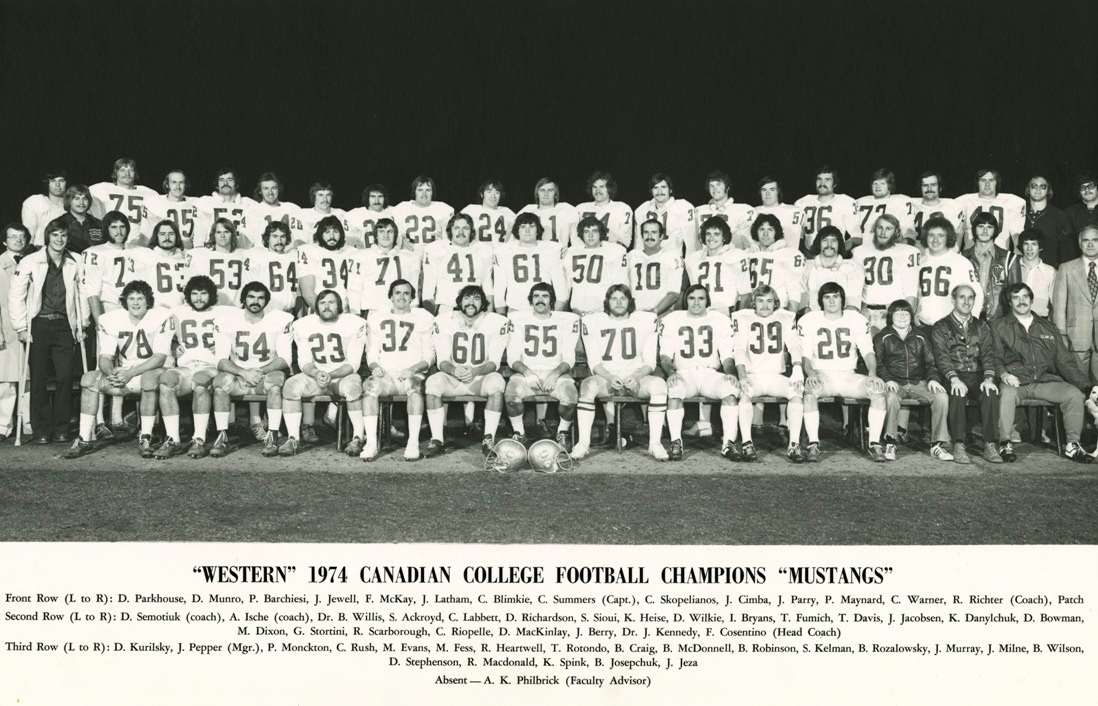50TH VANIER CUP INTERVIEW SERIES: 1974
A conversation with...
Phil Monckton, defensive end, University of Western Ontario Mustangs
In Vanier Cup X, the Western Ontario Mustangs overcame an early 9-0 deficit to upset the previously undefeated Toronto Varsity Blues 19-15 in front of a crowd of 24,777 at CNE Stadium in Toronto, an attendance number which at the time broke the previous game record by almost 8,000 fans. All-Canadian defensive end Phil Monckton was one of numerous Mustangs players who earned a second Vanier Cup ring on the day, as he was also part of Western’s first national championship team in 1971.
What is your major memory of the entire Vanier Cup week and the overall experience?
We were underdogs going into the game. I think that Toronto expected to win but we were calmly confident in our abilities, and we executed the game plan very well.
(Note: Toronto entered the 1974 Vanier Cup with a perfect 10-0 overall record, including a 28-6 win over the Mustangs during the regular season and a 45-1 domination of Saint Mary’s in the Atlantic Bowl)
What is your one major lasting memory of the actual game?
I took a penalty for a face mask. If I hadn't done so, the Toronto runner was gone and would likely have scored, so it was worth it. I will always remember the look on the runner's face as I yanked his head around.
What do you remember as the key play of the game?
Just before the end of the first half, Toronto was set to punt deep in their territory. The snap was high and we recovered the ball in the end zone for a touchdown to take a 10-9 lead. That gave us a lift going into the break.
What was your personal greatest play or moment?
Leading up to the crucial punt, we had been putting a lot of pressure on Toronto's offensive line and their centre. On that play, we broke through and changed the game around.
Did anything unusual or out of the ordinary happen during the game or during Vanier week?
We were getting so low on players that many of us were playing both ways near the end of the game. It got to the point where our quarterback, Bill Robinson, was drawing plays in the grass like we did as kids.
Did the coaches do anything different from normal routine in the preparation for the game?
The coaching staff at Western always did a great job of identifying the opponents’ weaknesses and of preparing us to exploit them. Our team was not big, nor fast, nor highly talented, but we were well prepared and we executed well.
How did you or the team react to the stadium and the crowd?
I was not particularly aware of the crowd other than the fact it was large.
What are your memories of the post-game celebrations on the field and/or in the dressing room?
I recall the field being swarmed with fans. The party back at the Royal York Hotel was good fun.
At the time, how did winning the Vanier Cup change your everyday life?
Being a Vanier Cup champion certainly provided me with a higher profile and probably helped to provide opportunities for employment.
How often to you reminisce about your Vanier Cup win?
Quite often. It was a fun and rewarding experience.
What did you study at Western?
I graduated in Physical Education and Physiology.
More about Phil Monckton (courtesy of Western University Athletics):
A key member of the Mustangs’ 1974 Vanier Cup team at defensive end, Phil Monckton earned CIAU all-Canadian honours that season. Along with playing for Western’s football team, Monckton also suited up for the university’s basketball and rowing squads. His accomplishments at Western earned him the Dr. Claude Brown Trophy in 1977, an award given to the male student-athlete judged to have made the greatest contributions to athletics at the university. Monckton was also honoured with an induction into the W Club Hall of Fame in 1986 and the Western Rowing Wall of Honour in 2013.
A supremely talented athlete who was a second-round selection of the Winnipeg Blue Bombers in the 1975 CFL draft, Monckton went on to compete for Canada on the international rowing stage, including a fifth-place finish in the Coxless Fours at the 1976 Summer Olympics in Montreal and - the highlight of his career - a bronze medal in the Quadruple Sculls at the 1984 Los Angeles Olympics.
Along with his success as an athlete, Monckton was a key member in developing Rowing Canada as an executive, serving as the organization’s vice-president of High Performance.


